Tacugama Chimpanzee Sanctuary: restoring the balance
As well as its vital rescue and rehabilitation work, Tacugama helps preserve wildlife and wilderness across Sierra Leone
Tacugama Chimpanzee Sanctuary, tucked in a pristine patch of rainforest outside Freetown, the capital city of Sierra Leone, is one of those special places worth planning your whole trip around. Hugely popular with nature-loving travellers, Tacugama is doing wonders for Sierra Leone’s endangered chimpanzees, orphaned or injured by the illegal wildlife trade, bushmeat hunting or deforestation.
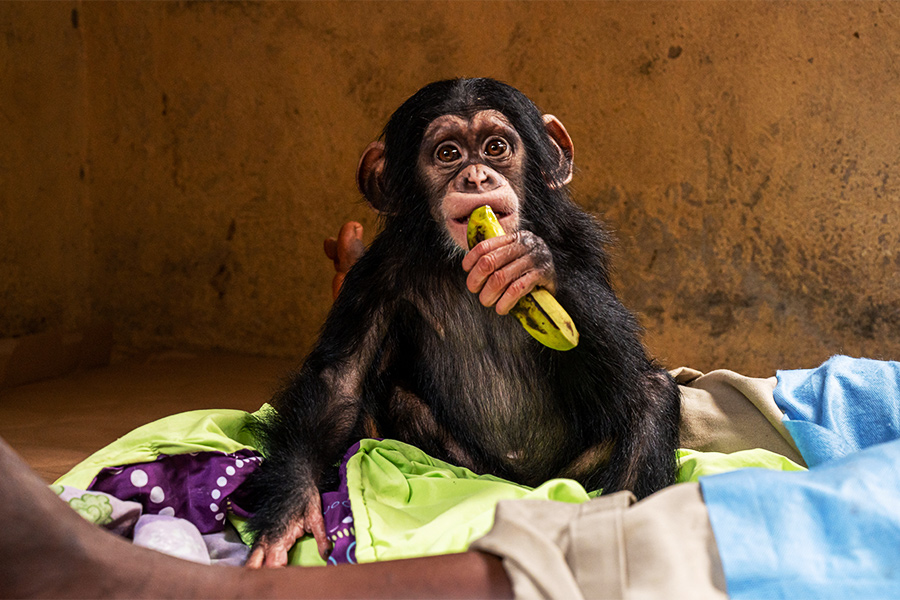
Snack time for this baby chimp / Image: Courtesy of Tacugama Chimpanzee Sanctuary

“We’re taking in rescues at an alarming rate, despite all our efforts. In 2022, we rescued ten and all are babies,” says development manager Aram Kazandjian. “Some hunters are trying to feed their families. If they see a group of chimps, they’ll try to get the most meat possible. For each baby brought to the sanctuary, about ten chimpanzees are killed.”
Sierra Leone is the among the few places travellers are likely to see western chimpanzees (also known as West African chimpanzees) in the wild. With over 80 per cent wiped out throughout equatorial Africa and only 5,500 wild individuals remaining in Sierra Leone, the western chimpanzee is the most at risk of extinction out of the four chimpanzee subspecies, having been classified as Critically Endangered by the IUCN (International Union for Conservation of Nature).
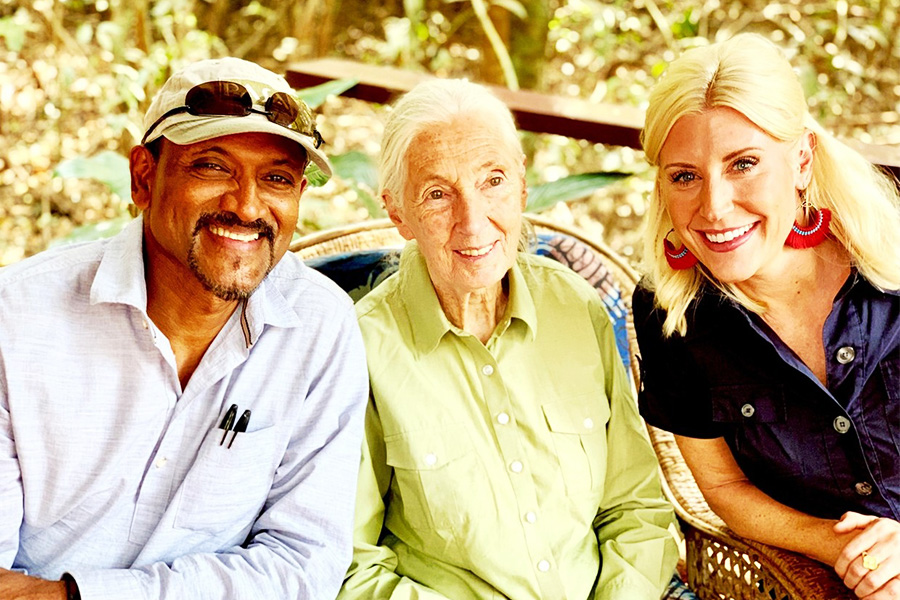
Renowned primatologist Jane Goodall with Bala Amarasekaran / Image: Courtesy of Tacugama Chimpanzee Sanctuary

In 2019, after primatologist Jane Goodall’s visit to Tacugama, the chimpanzee became Sierra Leone’s national animal and new face of tourism. “This is great for us,” says Aram. “The government prioritises chimp protection. Being the national animal means it’s prohibited to kill, sell, eat and keep them at home. We have a moral obligation to protect chimpanzees – they share 98.6% of our DNA.”
Tacugama was founded by Bala Amarasekaran and his wife Sharmila in 1995, seven years after they came across a sick baby chimp tied to a tree by the roadside. The Sri Lankan couple bought him for $20. “Just that first moment of the chimp gazing up at us and hugging us, my wife and I were really moved. We knew if we left this little guy behind, he would die.” They soon rescued others and found themselves caring for seven chimps in a makeshift shelter in the garden of their Freetown home. In need of space, they set up the reserve across 100 acres of forest in Western Area Peninsula National Park (now recognised as a biodiversity hotspot) with the help of the government and international donors.
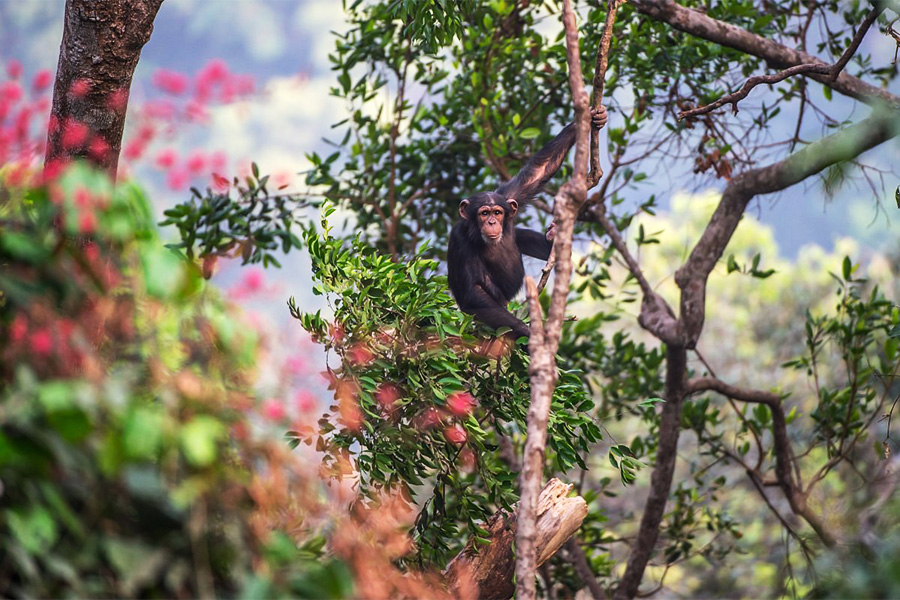
Young chimps honing their climbing skills / Image: Courtesy of Tacugama Chimpanzee Sanctuary

What started as a mercy mission has expanded to a vital refuge for the critically endangered primates and a quest to protect the country’s wildlife. “We try to do our best for every animal that we rescue, to make their lives different, because they have suffered at the hands of humans,” says Bala, who gave up a successful career as an accountant to begin rescue work at Tacugama, along the way teaching humans about one of our closest relatives. “We’ve got enclosures as large as 16 acres, but we can’t replicate the natural habitat or the freedom they’ve lost.”
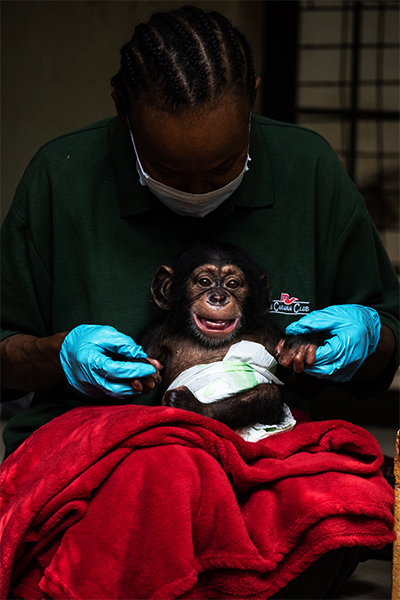
Tacugama’s courageous staff at work / Image: Renato Granieri
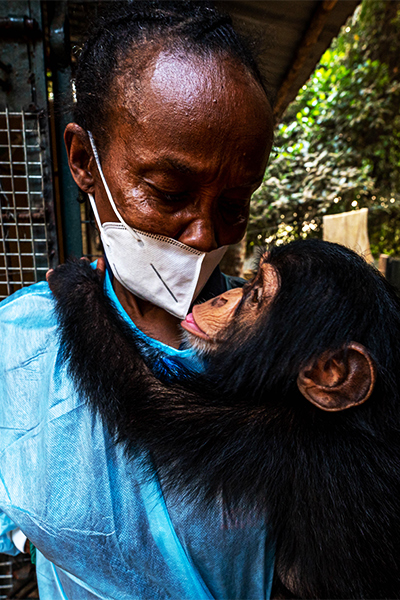
Mama P with Bk / Image: Courtesy of Tacugama Chimpanzee Sanctuary
Tacugama endured through many tough times, including Ebola, military coups and Sierra Leone’s brutal, 11-year civil war that ended in 2002. Rebels raided the sanctuary several times, looting food and medical supplies, and nearly destroyed it as they seized areas around Freetown. Bala and his courageous staff avoided the rebel roadblocks by carrying supplies at night through the forest. Even as the conflict raged around them, they managed to keep the chimps safe.
“The problem we’re having in the last few years is habitat destruction,” says Bala, explaining that the forest is constantly under threat as a result of rosewood trees being poached and plundered by struggling communities. “In the last couple of years alone, we’ve rescued about 25 chimps. When the sanctuary came to life, one of the first things the government gave us was law-enforcement authority. Through that, we did a lot of rescue and awareness creation. We got to the point where we destroyed the pet trade and got the government to ban the export of chimpanzees.”
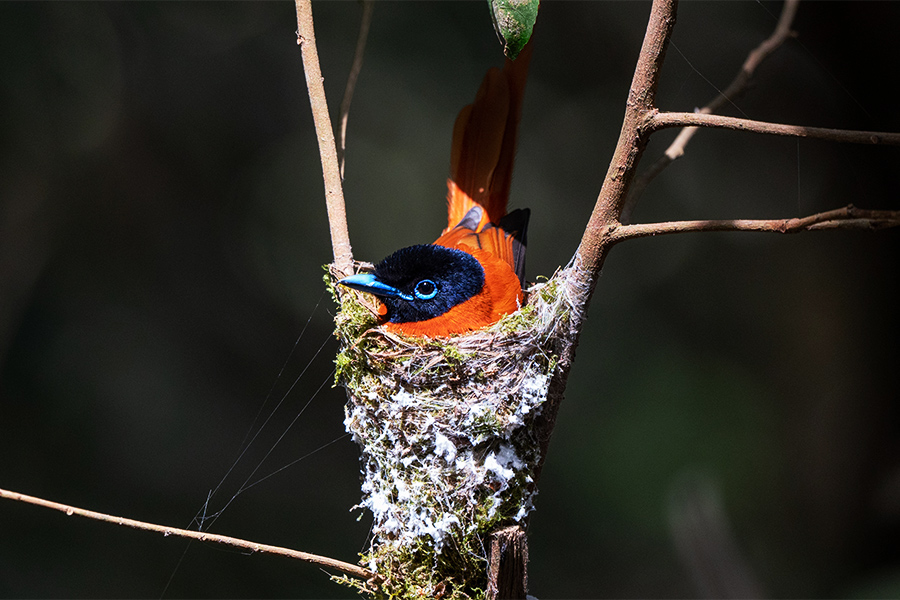
It’s not just chimps that live within Tacugama’s grounds / Image: Renato Granieri

Despite Tacugama’s many successes, forest felling and bushmeat hunting remain the greatest threats. A recent arrival at the nursery, which currently has 34 infants, is three-year-old Jean, rescued near the park with gunshot wounds on the head and chest, likely hit by stray bullets aimed at his mother. “Our latest rescue, Chicha, was being kept as a pet,” says Aram. “We found her in terrible shape. Only skin and bones, she had wounds and a severe skin infection. We weren’t sure she was going to make it. But she’s recovered and will be introduced to the others in the nursery. At seven-months-old she’s very young, but full of energy and joy.”
“We got to the point where we destroyed the pet trade and got the government to ban the export of chimpanzees”
The infant rescues are raised with tender, loving care to heal their psychological scars, before being re-socialised and introduced to new families within the sanctuary. “They need 24/7 care,” Aram explains of these young chimps. “In the wild they’re dependent on their mums and aren’t weaned until the age of three-to-four, and they remain with their mothers for several years. So, we’ve got a human surrogate, Mama Posseh, who looks after them until they’re four.”
Posseh Kamara, known as Mama P, provides reassurance, bottle feeds the chimps, bathes them and puts them to bed, very much like human babies, as well as teaching them basic skills, such as climbing trees, foraging and using tools. “They see me as their mother because I feed and care for them,” says Posseh. “They even cry for me. I love them so much and it breaks my heart to see what they have gone through.”
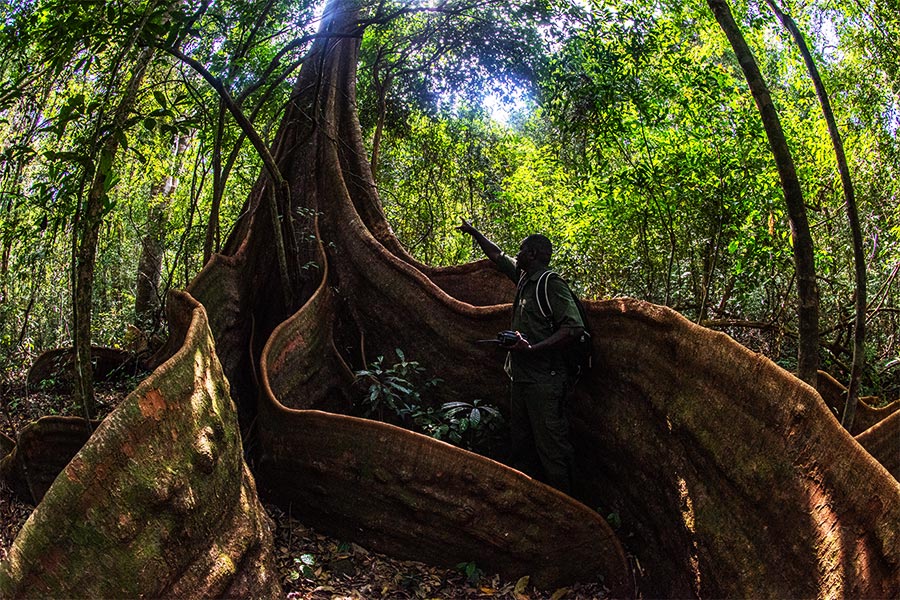
A tree straight out of a fairytale in part of Tacugama’s forest / Image: Renato Granieri

As well as providing lifelong care for its 115 residents within Western Area Peninsula National Park, Tacugama also manages four national parks, an additional responsibility handed to the sanctuary by the government. To help safeguard this land and the animals residing within it, Aram and his team have planted 60,000 trees within the parks to create the country’s first wildlife corridor, restoring the natural habitat for wild chimps. “It allows them safe passage and provides a source of food while minimising conflict,” Aram explains, “in the sense that they don’t need to raid farmers’ crops and orchards.”
Alongside the sanctuary’s NPAA (National Protected Area Authority) rangers, 45 eco-guards from the local community have been hired to patrol both protected and unprotected areas around the sanctuary and the national parks for illicit activities.
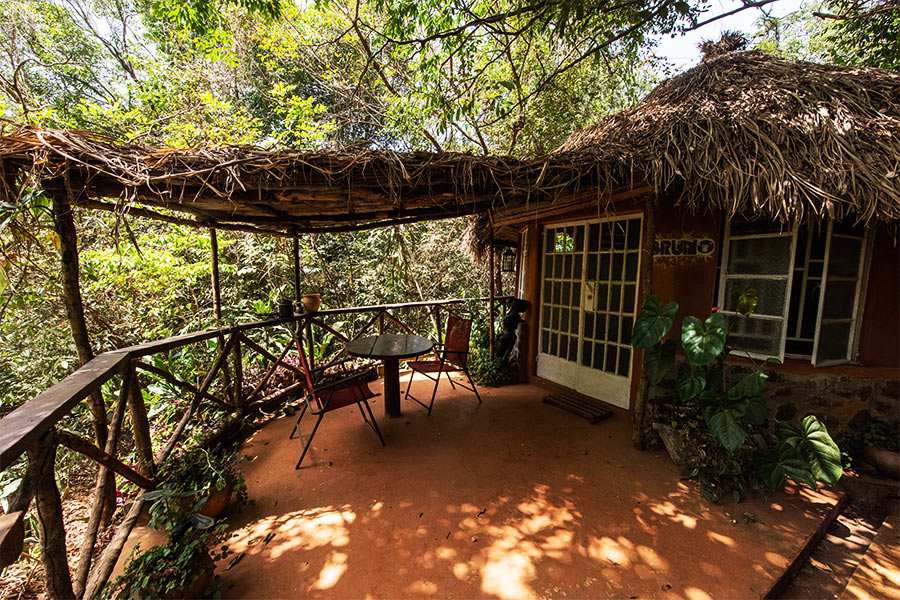
One of the sanctuary’s treehouse lodges / Image: Renato Granieri

Visitors can observe the work of nursery matron Mama P or get a glimpse of older chimps frolicking in forested enclosures on the sanctuary’s grounds. Another option is to stay overnight in one of Tacugama’s treehouse lodges, overlooking swathes of tropical rainforest. Guests can also take part in yoga retreats, guided bush walks, cinema nights and other activities, all while being part of something that benefits wildlife preservation.
“It’s a calm, peaceful environment,” says Aram. “You wake up in the canopy among the trees to the smell of orchid perfume, see the brightly coloured birds shimmering in the sunlight and listen to the joyful hoots and calls of the chimps.”
Find out about donating to Tacugama, adopting a chimp or planning a visit to the sanctuary at tacugama.com.